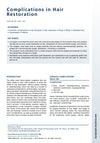Complications of Hair Restoration Surgery: A Retrospective Analysis
October 2014
in “
International Journal of Trichology
”
hair restoration surgery androgenetic alopecia postoperative edema sterile folliculitis wide donor scar numbness paresthesia bacterial folliculitis necrosis scarring adverse drug reaction cefotaxime hair bleaching hydrogen peroxide hair transplant male pattern baldness swelling folliculitis donor scar tingling infection tissue death drug reaction antibiotic bleach

TLDR Hair restoration surgery can lead to swelling, infections, scarring, numbness, hiccups, and poor hair growth.
Between December 2010 and August 2014, a retrospective analysis of 73 male patients who underwent hair restoration surgery for androgenetic alopecia revealed several complications. Postoperative edema was the most common, affecting 42.47% of patients, followed by sterile folliculitis in 23.29%, wide donor scar in 15.07%, and numbness/paresthesia and bacterial folliculitis each in 10.96% of patients. Additionally, 4.11% experienced postoperative hiccups, and poor growth of transplanted hair was reported by 60.27% of patients as less than 50% growth, and by 27.4% as less than 25% growth. Rare complications included necrosis, scarring from an adverse drug reaction to cefotaxime, and hair bleaching from excess hydrogen peroxide. The study highlighted the necessity of careful preoperative evaluation, skilled surgical technique, and effective management of complications for satisfactory hair restoration surgery outcomes.








